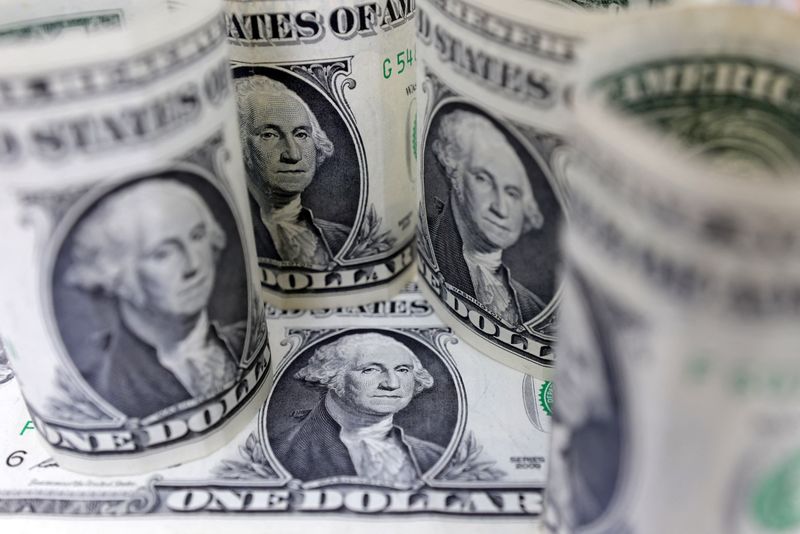By Karen Brettell
NEW YORK (Reuters) -The dollar fell to a seven-month low and the Japanese yen hit a more than one-week high as traders awaited comments from Federal Reserve Chair Jerome Powell this week that are expected to signal the U.S. central bank will start cutting interest rates in September.
A key focus on Powell’s speech at Jackson Hole on Friday will be whether he indicates the Fed is likely to cut rates by 25 or 50 basis points. Odds of a larger cut have declined since data last week showed hotter-than-expected shelter inflation for July and also a strong retail sales report for the month.
Another main focus will be whether Powell indicates rate cuts are likely at each meeting going forward. But markets may be overestimating how far and fast the Fed is likely to act.
“I think we’re still at the point of the justification to cut in September,” said Eugene Epstein, head of structuring for North America at Moneycorp in New Jersey.
“On a relative basis it would be kind of over the top to be one of the last central banks to start their cutting cycle, but then also to start cutting immediately and cut 50 basis points and then cut every meeting after that,” Epstein said.
Powell may also be reluctant to commit to any details this week with inflation and jobs data for August still due before the Fed's September meeting.
Traders are pricing in a 23% chance of a 50-basis-point cut, down from 50% a week ago, with a 25-basis-point reduction having odds of 77%, according to the CME Group’s FedWatch Tool. Around 210 basis points of rate reductions are expected by the end of 2025.
In early August traders aggressively priced for imminent rate cuts after an unexpected increase in the unemployment rate in July raised concerns about a possible recession.
A large unwind of popular dollar/yen carry trades, in which traders borrowed the low interest rate yen and bought higher yielding U.S. assets, also roiled the stock market and led to a sharp repricing of rate expectations.
Now, “it seems like the market's starting to correct itself a little bit more in the right direction,” said Epstein.
Minneapolis Fed President Neel Kashkari said it was appropriate to discuss potentially cutting U.S. rates in September because of the rising possibility of a weakening labor market, the Wall Street Journal reported on Monday.
San Francisco Federal Reserve Bank President Mary Daly said it is time to consider adjusting borrowing costs from their current range of 5.25% to 5.5%, speaking in an interview with the Financial Times published on Sunday.
Federal Reserve Bank of Chicago President Austan Goolsbee said on Sunday U.S. credit conditions are tight and getting tighter, and that while there's no certainty the Fed will cut interest rates next month as is widely anticipated, not doing so could hurt the job market.
Data on Wednesday that will show revisions to the government's jobs data for the period from April 2023 to March 2024 could influence Powell's comments on Friday.
"Powell has indicated that the Fed is monitoring the labor market carefully for indications of deterioration and stands ready to intervene if necessary," Quincy Krosby, chief global strategist at LPL Financial, said in note on Monday.
"Should the report reveal a considerably smaller number of jobs that were created than were initially announced in monthly payroll reports, the Fed chair's concerns could be amplified in his comments," Krosby said.
Minutes from the Fed’s July meeting on Wednesday will also be evaluated for any new clues on its expected rate trajectory.
The dollar index was last down 0.56% at 101.89 and reached 101.85, the lowest since Jan. 2. The euro rose 0.47% to $1.108 and got as high as $1.1085, its strongest since Dec. 28.
The dollar weakened 0.62% to 146.66 Japanese yen after earlier reaching 145.20, the lowest since Aug. 7.
The Japanese currency has gained on optimism that the interest rate gap between the U.S. and Japan will continue to shrink and due to a continued unwind of dollar/yen carry trades.
Bank of Japan Governor Kazuo Ueda is expected to discuss the BOJ's decision last month to raise interest rates when he appears in parliament on Friday.
Japan's consumer inflation rate likely picked up in July for a third consecutive month, a Reuters poll of 18 economists showed, keeping the central bank on course to consider another rate hike after lifting short-term rates to 0.25% last month.
The Australian dollar was boosted by optimism that China will offer new stimulus with shopping vouchers meant to help get growth back towards this year's target of roughly 5%.

The Aussie was last up 0.95% at $0.6729 and reached $0.6732, the highest since July 18.
In cryptocurrencies, bitcoin fell 0.44% to $59,034.